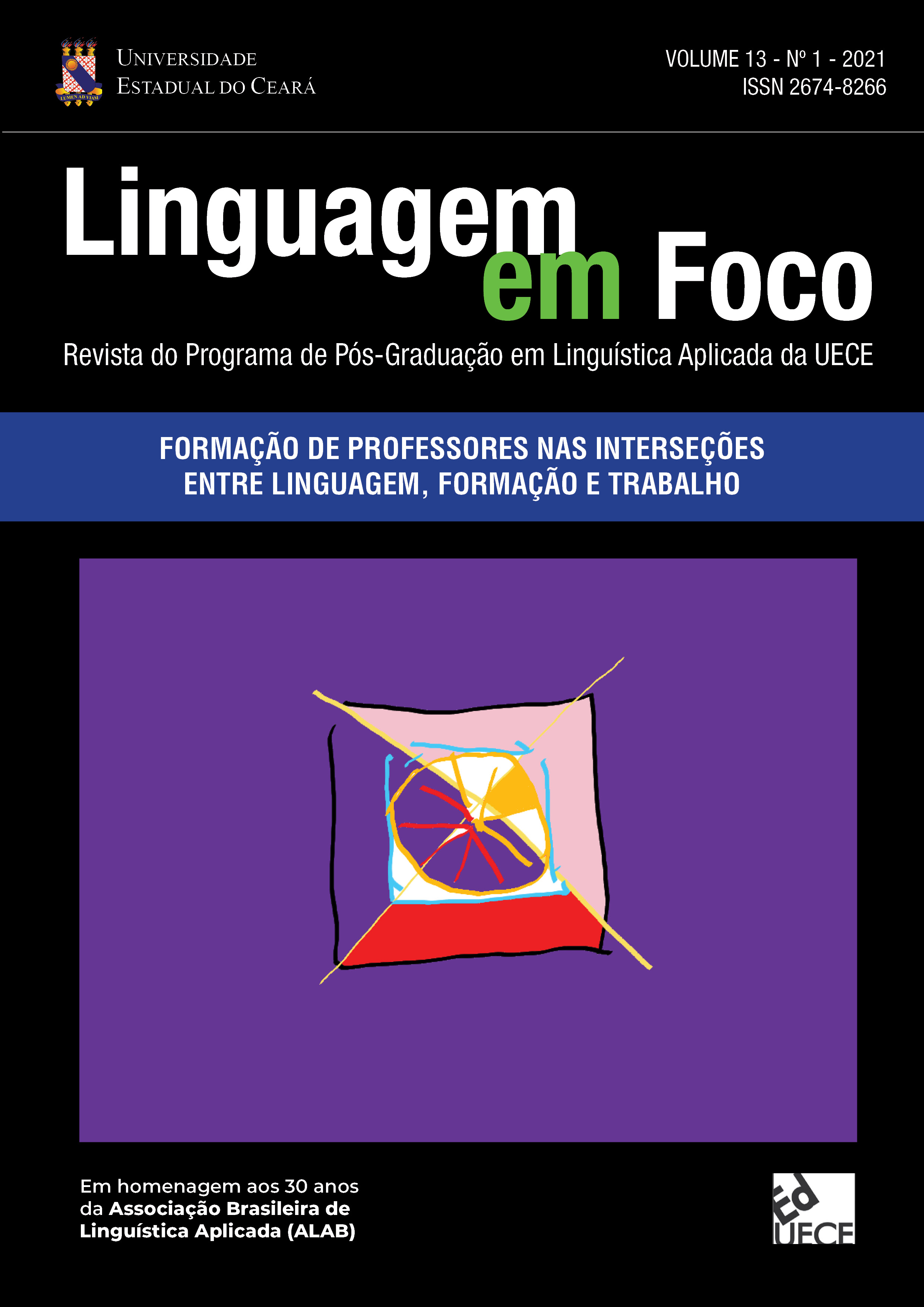A negociação de saberes em um contexto de formação inicial de professores de Língua Inglesa
DOI:
https://doi.org/10.46230/2674-8266-13-4950Palavras-chave:
Formação de professores, Língua Inglesa, PIBID, Linguística Aplicada, LetramentosResumo
Este artigo é um recorte de minha dissertação de mestrado que teve por objetivo principal investigar a formação de professores de Língua Inglesa em contexto de um Subprojeto vinculado ao Programa Institucional de Bolsas de Iniciação à Docência (Pibid). Trata-se de pesquisa de natureza qualitativa de cunho etnográfico, com características de epistemologia da emergência. A pesquisa foi desenvolvida em contexto de uma escola pública da cidade de Campo Grande - MS e teve como participantes uma professora supervisora da escola, quatro licenciandos do Pibid e esta pesquisadora. Os dados foram coletados por meio de gravações em áudio e/ou em vídeo das reuniões de planejamento e aulas, questionários e entrevistas com os participantes. A análise consiste, principalmente, na descrição dos aspectos emergentes ao longo do processo de formação investigado e suas interfaces com a formação de professores na contemporaneidade. A pesquisa indicou que o enfraquecimento de hierarquias entre pesquisador, pesquisado e licenciandos, por meio de uma ressignificação da relação entre escola e universidade e seus saberes, resultou em práticas colaborativas ao longo do processo de formação de professores.
Downloads
Referências
BRASIL. Orientações Curriculares para o Ensino Médio: Línguas Estrangeiras. In: Linguagens, Códigos e Tecnologias. Brasília: MEC, 2006. Disponível em: http://goo.gl/RxeyS3. Acesso em: julho de 2014.
CRAWSHAW, R. Intercultural awareness as a component of HE Modern Language courses in the UK, 2005.
DUBOC, A. P. M. Atitude Curricular: Letramentos Críticos nas brechas da formação de professores de inglês. Tese de doutorado. Programa de Pós-Graduação em Estudos Linguísticos e Literários em Inglês do Departamento de Línguas Modernas da Faculdade de Filosofia, Letras e Ciências Humanas da Universidade de São Paulo: USP. 2012. 246 f.
______. O ensino de línguas estrangeiras na contemporaneidade: teorias em prática. Palestra proferida no VI EPLIMS. Campo Grande, MS, 04 de novembro de 2011.
FREIRE, P. Pedagogia do oprimido. 17ª ed. Rio de Janeiro, Paz e Terra, 1987.
______. Pedagogia da autonomia: saberes necessários à prática educativa. São Paulo: Paz e Terra, 1997.
GEERTZ, C. Nova luz sobre a antropologia. Rio de Janeiro: Jorge Zahar, 2001.
_____; FOGAÇA, F. C. Ensino de inglês, letramento crítico e cidadania: um triângulo amoroso bem-sucedido. Línguas e Letras, 2007, v. 8, n. 14, p. 79 – 105.
KALANTZIS, M. COPE, B.. New learning: Elements of a science of education. Second edition. Port Melbourne, Victoria, 2012.
LUKE, A.; FREEBODY, P. Shaping the social practices of reading. In: MUSPRATT, S.; LUKE, A.; FREEBODY, P. (Eds.). Constructing critical literacies. St. Leonards: Hampton Press, 1997. p. 185-225.
MACIEL, R.F. Letramento crítico das políticas linguísticas e a formação de professores de línguas. In: Nara Hiroko Takaki; Ruberval Franco Maciel. (Org.). Letramentos em Terra de Paulo Freire. Campinas: Pontes, 2014a.
_______. "Eu sei o que é bom pra você!" A lógica da emancipação revisitada e a formação de professores. Novos letramentos, formação de professores e ensino de língua inglesa. 1ed. Maceió: Udufal, 2014b, v. 1, p. 247-268.
______. Negociando e reconstruindo conhecimentos e práticas locais: os documentos oficiais e a formação de professores de inglês. Tese [Doutorado]. Programa em Estudos Linguísticos e Literário de Inglês. USP, 2013.
MATTOS, A. M. A.; VALÉRIO, K. M.. Letramento crítico e ensino comunicativo: lacunas e interseções. Revista Brasileira de Linguística Aplicada, v. 10, n. 1, p. 135-158, 2010.
MENEZES DE SOUZA, L. M. T. O professor de inglês e os letramentos no século XXI: métodos ou ética? In: JORDÃO, C.M., MARTINEZ, J.Z., HALU, R.C. (orgs.). Formação “desformatada”: práticas com professores de língua inglesa. Campinas: Pontes Editores, p. 279-303, 2011.
MIGNOLO, W. D. Local histories/global designs: coloniality, subaltern knowledges and border thinking. Princeton, NJ: Princeton University Press, 2000.
MILLER, I. K. Formação de professores de línguas: da eficiência à reflexão crítica e ética. In: LOPES, L. P. da M. (org.). Linguística Aplicada na modernidade recente: festschrift para Antonieta Celani. São Paulo: Parábola, pp. 99-121, 2013.
MONTE MÓR, W. M. Caderno de Orientações Didáticas para EJA: Línguas Estrangeiras. 1. ed. São Paulo: SME, 2010. vol. 1. 146 p. Disponível em: http://goo.gl/TfSXFd. Acesso em: agosto de 2014.
______. Eu e o outro: imagens refletidas. Um estudo sobre identidade e alteridade na percepção das culturas, Interfaces nº8. Rio Grande: FURG/ABECAN, 2008, p 161-180.
______. Investigating critical literacy at the university in Brazil. Critical Literacy: Theories and Practices, v. 1, n. 1, p. 41-51, 2007. Disponível em: http://goo.gl/gmyy9e. Acesso em: dezembro de 2014.
RANCIÈRE, J. O mestre ignorante: Cinco lições sobre a emancipação intelectual. Belo Horizonte: Autêntica, 2007.
_______. A gramática do tempo: para uma nova cultura política. 3. ed. São Paulo: Cortez, 2010.
SILVA, S. B. Da técnica à crítica: contribuições dos letramentos críticos para a formação de professores de língua inglesa. Porto Alegre: Editora da Oficina, 2012.
TAKAKI, N. H. Da metodologia de pesquisa em letramentos e sociedade para a ética: implicações na formação continuada da comunidade científica. Polifonia, Cuiabá, MT, v. 19, n. 25, p. 87-110, jan/jul, 2012.
TODD, S. Learning from the Other: Levinas, psychoanalysis, and ethical possibilities in education. New York: Suny Press, 2003.
Publicado
Como Citar
Edição
Seção
Licença
Copyright (c) 1969 Themis Rondão Barbosa da Costa Silva

Este trabalho está licenciado sob uma licença Creative Commons Attribution 4.0 International License.
Os autores que publicam na Linguagem em Foco concordam com os seguintes termos:
- Os autores mantêm os direitos autorais e concedem à revista o direito de primeira publicação. Os artigos estão simultaneamente licenciados sob a Creative Commons Attribution License que permite a partilha do trabalho com reconhecimento da sua autoria e da publicação inicial nesta revista.
- Os conceitos emitidos em artigos assinados são de absoluta e exclusiva responsabilidade de seus autores. Para tanto, solicitamos uma Declaração de Direito Autoral, que deve ser submetido junto ao manuscrito como Documento Suplementar.
- Os autores têm autorização para disponibilizar a versão do texto publicada na Linguagem em Foco em repositórios institucionais ou outras plataformas de distribuição de trabalhos acadêmicos (ex. ResearchGate, Academia.edu).





























